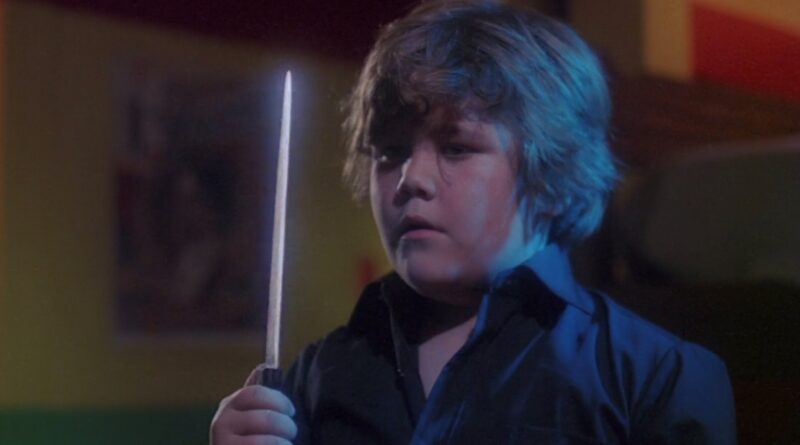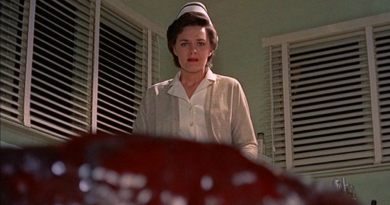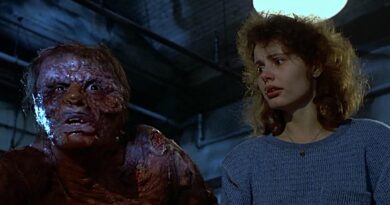Trick or Treats (1982)
The tagline on the poster of Trick or Treats reads, “…when Halloween night stopped being fun!” Rare for an incomplete sentence conjured up by a marketing department to so accurately describe the film it’s attached to. Not only is this movie not fun, it’s painfully incompetent. It’s a horror movie with no scares, a comedy without laughs. The story is so rife with plot holes and inconsistencies that one wonders if the screenplay fell victim to a pair of scissors. The dialogue is about as believable as a three-dollar bill. The performances are so bad, it makes the unintentional camp of Glen or Glenda seem Oscar-worthy. Everything about this film is so shoddy that I actually wished it was a ripoff of genre hits like Halloween or Friday the 13th.
I’m typically the first to denounce the gore and violence that’s glorified in slasher films, especially when female characters are subjected to them. Trick or Treats is entirely devoid of murder sequences until the final fifteen minutes. Up until that point, it’s a repetitive, long-winded narrative build-up with awful character development and the occasional stray into unconvincing, inconsequential subplots. It was so plodding that I gave my morality a rest and actually yearned for constant death scenes. They might have relieved me of my boredom. Then again, maybe they wouldn’t have; the few kills we end up seeing are so awkwardly shot, so badly paced, and so poorly performed that they generate no visceral thrills.
It tells the story of an aspiring actress (Jackelyn Giroux) who’s forced into babysitting on Halloween night due to finances. As the night progresses, and between uneventful interludes of handing out candy to trick-or-treaters, she repeatedly falls victim to the pranks of the boy she babysits (Chris Graver), a malicious brat whose room is a shrine of magic tricks. Although the kid can’t be more than eight or nine years old, he’s so off-putting that, so help me God, I actually wanted him to end up getting killed. Even though the babysitter tries unsuccessfully to instill within the kid the message of The Boy Who Cried Wolf, she’s gullible enough to fall for his tricks almost every time.
Meanwhile, the boy’s father (Peter Jason) escapes from a mental institution and vows revenge against his ex-wife (Carrie Snodgress), who had him committed four years earlier for reasons never given. The best we get is the very opaque impression that she’s a cold-hearted gold digger, as evidenced by her current marriage to a rich lecherous creep (David Carradine). Anyway, the father’s escape involves him dressing as one of the institution’s female nurses and simply walking out the front door. I don’t know if the “comedy” is supposed to stem from the fact that he wanders the streets in drag or that several men are inexplicably convinced by his poor excuse of a disguise and try to hit on him. Either way, it’s not funny. It’s just pathetic.
The subplots interwoven throughout are embarrassing, not only because they’re just as badly acted as all the others, but also because they prove either distantly related to the main plot or altogether unnecessary. They also reveal several gaps in logic. Consider the babysitter’s periodic phone conversations with her boyfriend (Steve Railsback), an actor always seen backstage at a performance of Othello; one wonders how he knew the number of the home she’s babysitting at, since we never hear her giving it to him. Also consider a lengthy scene of two young women at a studio editing a B-grade horror movie; it takes way too long for their significance to be revealed. And then consider the mother and her new husband, who caught a flight to Las Vegas, disembarked the plane, got their luggage, found transportation from the airport, and checked into their hotel in what seemed to be less than an hour. Why they’re in Vegas at all is never explained. In fact, I seem to remember them saying early on that they would be spending Halloween night at some party.
It’s amazing just how badly all this is photographed. Writer/director/editor/producer Gary Graver (Chris’ actual father) also acted as his own cinematographer, which is to say that, on the basis of what I ended up looking at, he apparently relied only on whatever lighting was already available to him in the rooms of the house – which, incidentally, was obviously a real house and not a set. The result is a picture that isn’t shadowy so much as muddy and dim. My guess is that Graver also acted as his own cameraman, given the inordinate number of uninterrupted master shots that make the whole thing feel like an amateur home movie. And my God, the music; no composer credit is given, which I guess means that every cue, which is to an orchestra what canned laughter is to an audience, came from a stock sound library. Watching Trick or Treats forces one to wonder how some movies manage to find their way into theaters.




